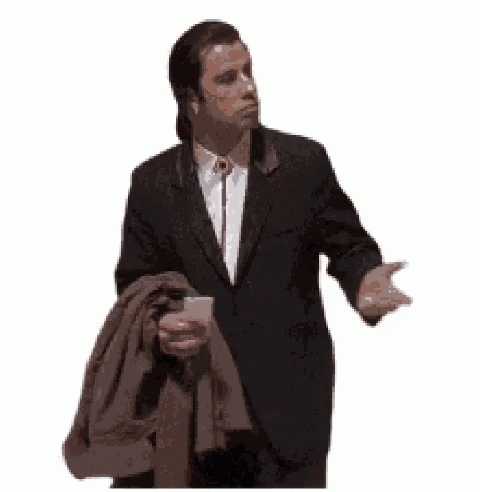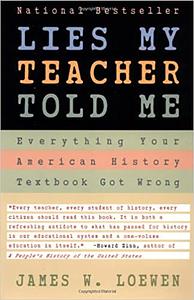Take a photo of a barcode or cover
1.03k reviews for:
Lies My Teacher Told Me: Everything Your American History Textbook Got Wrong
James W. Loewen
1.03k reviews for:
Lies My Teacher Told Me: Everything Your American History Textbook Got Wrong
James W. Loewen
This should be required reading for any teacher of SS. I am going into the school year with a fresh perspective about how I will teach American history. I will be mindful of the texts I read for American exceptionalism archetypes and present all of my essential questions as discoveries and not “here’s the answer, kids”. I will probably even share excerpts of this with them.
challenging
informative
reflective
slow-paced
This is a necessary read. The relevance of this book in 2025 is astounding. Excellent read!
Not as interesting as I had hoped. I was looking forward to some unknown tidbits about our American history but got more about what textbooks do wrong in the treatment of American history. It was all good stuff but not as captivating for me personally.
challenging
informative
inspiring
reflective
slow-paced
learned more history and the social structures that drove them in this book more than i have in my entire education. very informative and inspired updates in my approach to critical thinking
I learned so much. Many realizations of what I missed…what I’ve been wrong about…and how important history is. This book earned a place on my “favorites” shelf.
challenging
informative
reflective
slow-paced
I loved this book, especially the first third and the last third. If you've read my previous reviews on history related books, you'd know that I'm frequently shocked at what wasn't taught in school. If I were to go back to the beginning of my Goodreads "You Oughta Know" journey, I would have started with this book as it provided a solid foundation.
One particular topic/issue Loewen addressed was the disconnect between adults and current issues. Since many of us didn't learn later than the Vietnam War (I know I didn't), we struggle to comprehend the current issues we face today. How can we solve our current issues if we don't know how they began? Or our complicated and shameful hidden past? Or our relationships with foreign nations? I feel like I just recently began to understand the War on Iraq and that's taken at least three or four books to get a grasp on it.
If I'm being entirely honest, there's quite a few things I still don't know, even after getting a bachelors. And let it be known, history was my favorite class. Like Desert Storm? No idea. The Korean War? I couldn't give you the decade. What policies did Bush or Reagan or Clinton implement? I'm trying!
I've been thinking long and hard about that issue - where we (I) don't understand our (the US) extensive past. With the current election, it seems like everyone knows exactly what's going on. I'm just sitting here like

...how do you all know what's going on and what's happened? And so confidently?
Which reminds me of another issue Loewen talked about - our aim to be so certain about our nation's history. Textbooks and teachers desire to have a single, solid answer to everything when in actuality most of history is up to interpretation. There's usually several theories or several causes to historical events. Loewen believes that being honest to students with our uncertainity would lead to greater curiosity and classroom discussions, as well as having a better grasp on how to solve big issues when students become nation leaders. (But alas wouldn't that make multiple choice question tests more difficult?? /s)
The last topic that caught my attention was on corporations. Loewen explains that some corporations are so wealthy and globally spread out that they're essentially their own nations. I had never thought of that. Corporations can have more money than entire nations??? I guess it's obvious when I think about it, but never had I taken it into serious consideration. He also explained how the US will intervene in foreign elections and promote chaos if it benefits a corporation. Who knew 16 years of education would keep such fun facts out of the classroom? ¯\_(ツ)_/¯
My flaws with the book - I thought the middle was quite dry. Also, I am not sure I agree with his theory that the most educated are the most hawkish on foreign policy. But maybe it's because I think I'm educated when in reality I'm not because I wasted 16 years being taught a bunch of shit I have to unlearn ¯\_(ツ)_/¯ Overall, I very much recommend this book and wish I had a history book club to be part of.
Also s/o to anyone who actually reads my reviews lol
One particular topic/issue Loewen addressed was the disconnect between adults and current issues. Since many of us didn't learn later than the Vietnam War (I know I didn't), we struggle to comprehend the current issues we face today. How can we solve our current issues if we don't know how they began? Or our complicated and shameful hidden past? Or our relationships with foreign nations? I feel like I just recently began to understand the War on Iraq and that's taken at least three or four books to get a grasp on it.
If I'm being entirely honest, there's quite a few things I still don't know, even after getting a bachelors. And let it be known, history was my favorite class. Like Desert Storm? No idea. The Korean War? I couldn't give you the decade. What policies did Bush or Reagan or Clinton implement? I'm trying!
I've been thinking long and hard about that issue - where we (I) don't understand our (the US) extensive past. With the current election, it seems like everyone knows exactly what's going on. I'm just sitting here like

...how do you all know what's going on and what's happened? And so confidently?
Which reminds me of another issue Loewen talked about - our aim to be so certain about our nation's history. Textbooks and teachers desire to have a single, solid answer to everything when in actuality most of history is up to interpretation. There's usually several theories or several causes to historical events. Loewen believes that being honest to students with our uncertainity would lead to greater curiosity and classroom discussions, as well as having a better grasp on how to solve big issues when students become nation leaders. (But alas wouldn't that make multiple choice question tests more difficult?? /s)
The last topic that caught my attention was on corporations. Loewen explains that some corporations are so wealthy and globally spread out that they're essentially their own nations. I had never thought of that. Corporations can have more money than entire nations??? I guess it's obvious when I think about it, but never had I taken it into serious consideration. He also explained how the US will intervene in foreign elections and promote chaos if it benefits a corporation. Who knew 16 years of education would keep such fun facts out of the classroom? ¯\_(ツ)_/¯
My flaws with the book - I thought the middle was quite dry. Also, I am not sure I agree with his theory that the most educated are the most hawkish on foreign policy. But maybe it's because I think I'm educated when in reality I'm not because I wasted 16 years being taught a bunch of shit I have to unlearn ¯\_(ツ)_/¯ Overall, I very much recommend this book and wish I had a history book club to be part of.
Also s/o to anyone who actually reads my reviews lol
This is a great book. The only reason I didn't give it 5 stars was because I found it a little too long and a couple of things in the later chapters seemed repetitive. BUT I THINK EVERYONE SHOULD READ THIS BOOK. I was going to say everyone who was interested in history or American history or how history is taught, but really, we should all be interested in American history, because it is the story we tell ourselves about ourselves. Loewen does a great job right off the bat talking about heroification, using contemporaries Woodrow Wilson and Helen Keller as examples of how by telling only the tame palatable stories about people's lives we lose the chance to learn from them as real human beings. And in the same way, if we don't tell about our collective mistakes, we can't learn from them, AND it makes American history boring and everyone's least favorite subject.
His task is twofold: he attempts to both explain the shortcomings of how American history is taught and also to correct some of the errors this incorrect presentation has propagated. He limits his critique of teaching methods to high school American history and the textbooks used in public schools. Even while limiting his scope in this way, he manages to effectively convey the state of textbook publishing: that fewer companies are dominating the market, and most of the books are simply updates of old texts; and that these updates often add much volume and little substance, and also, by leaving in old material, makes the text frequently contradict itself.
His structure for the content of the book is impressive and makes his case convincing. He attempts to correct the most significant misconceptions propagated by American history classes in US classrooms, which are primarily related to three big topics: 1) the conquest of the land that would become the United States and the people who lived there, 2) slavery and black-white race relations, and 3) the portrayal of US involvement in the Vietnam War and other military interventions all over the world. Along the way he discusses many topics related to these three broad areas, and of course he does not cover everything, but he correctly addresses these as the three biggest historical topics on which we have been led astray.
His task is twofold: he attempts to both explain the shortcomings of how American history is taught and also to correct some of the errors this incorrect presentation has propagated. He limits his critique of teaching methods to high school American history and the textbooks used in public schools. Even while limiting his scope in this way, he manages to effectively convey the state of textbook publishing: that fewer companies are dominating the market, and most of the books are simply updates of old texts; and that these updates often add much volume and little substance, and also, by leaving in old material, makes the text frequently contradict itself.
His structure for the content of the book is impressive and makes his case convincing. He attempts to correct the most significant misconceptions propagated by American history classes in US classrooms, which are primarily related to three big topics: 1) the conquest of the land that would become the United States and the people who lived there, 2) slavery and black-white race relations, and 3) the portrayal of US involvement in the Vietnam War and other military interventions all over the world. Along the way he discusses many topics related to these three broad areas, and of course he does not cover everything, but he correctly addresses these as the three biggest historical topics on which we have been led astray.
challenging
informative
reflective
medium-paced





